|
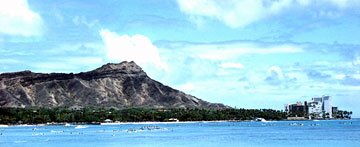 Hawaii
Photo Galleries Hawaii
Photo Galleries
After finishing Basic Training at Ft. Leonard Wood and Advanced Individual Training at Ft. Sam Houston, I was assigned
to Schofield Barracks, Hawaii, located on the island of Oahu, as my first duty station. It seems so long ago now,
but there are still some things that stand out to me.
I remember getting out of the airplane and walking into the airport when I arrived.
The Hula girls I was expecting never materialized but there were plenty of flowers. Their scent was overwhelming
and left me with no doubt that I was in paradise. It was warm that night, but not uncomfortably so. In fact,
the temperature was perfect. There is something about the climate of the Hawaiian Islands that I can not
describe. All I can say is it made me feel good.
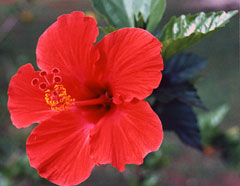 This
was the first time I had gone anywhere in the Army on my own. There were no Drill Sergeants to hold my hand.
To be honest, I really wasn't sure what I was supposed to be doing. I expected that there would be someone there
to greet me but there wasn't. I reported to the USO and was told to sit tight and wait for the next bus heading to
Schofield. This
was the first time I had gone anywhere in the Army on my own. There were no Drill Sergeants to hold my hand.
To be honest, I really wasn't sure what I was supposed to be doing. I expected that there would be someone there
to greet me but there wasn't. I reported to the USO and was told to sit tight and wait for the next bus heading to
Schofield.
Eventually I was taken to the inprocessing center where I stayed for a couple days.
When I was released, my NCOIC, SSG Hyler, escorted me to my new unit, the 725th Main Support Battalion. I was
assigned to a two-man barracks room that was occupied by my new roommate. Barracks life in that unit wasn't
pleasant. I had an alcoholic neighbor who listened to hard-core rap day and night. The guy was a punk from
the word GO. He was never without a "Forty" or hard liquor, even during the duty day. He played his
music so loud that my pictures would fall from the walls.
On other side was a guy who listened to alternative at about the same volume.
Across the hall there was still someone else who blasted country. Basically it sucked for the rest of us. At
times we would get so frustrated that we would flip the circuit breakers, but that would only give us a few minutes of
relief. Sometimes the music would go until 3 AM. Other times it would be off until they came back from the
bars at 3 AM and woke everyone up.
 Even though there were numerous
complaints against these soldiers, our chain of command did nothing about any of it. Their response to the
situation was for us to "work out our differences." That pretty well describes how my unit operated overall.
If they did not want to deal with something, they pretended the problem did not exist. Even though there were numerous
complaints against these soldiers, our chain of command did nothing about any of it. Their response to the
situation was for us to "work out our differences." That pretty well describes how my unit operated overall.
If they did not want to deal with something, they pretended the problem did not exist.
There was a saving grace, however. I had the two best leaders of my army career
in my section. I can not say enough good things about SSG Hyler and CPT Wheeler. They showed their
soldiers how to perform their mission by performing it themselves rather than sitting back saying "I do not have to do
it any more. I have done it. Now it is your turn." Anyone in the Army who has had an "Admin NCO"
knows what I am talking about. Whenever we needed help, we could go to either of them. We had a
tight-knit section. Often we would stay after work and BBQ some food, drink a couple beers and bullshit. If
any of us ever screwed up they would take us aside and set us straight. But they never threw us to the wolves.
In fact, neither one of them was afraid to stand up to the chain of command.
Our unit thought that all we did was sit around watching TV all day. Never once
did anyone from my unit actually visit our section to see what we do. I asked them to several times, but they
elected not to for whatever reason. Because of its perception of our job, the unit constantly trying to pull
us away from our duties to come down and clean their offices, etc. What they did not know was every one of us
carried a full case-load of patients in addition to performing our field mission, pulling duty and a variety of other
things. Sometimes we won and sometimes we did not. What mattered to me was that our leadership made the
effort to do the right thing. During my nine plus years in the army I only had three leaders having that kind of
backbone. The third was SGT Floyd who was my NCOIC at Ft. Campbell.
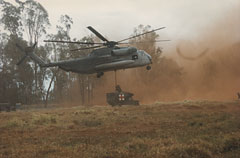 Ten days
after reporting to my unit I went to the field for the first time. That experience sticks with me to this
day. We had been sitting in our vehicles over night waiting to move out. At some ungodly hour in the morning
we were woken to check our vehicles and ensure the equipment was strapped down tight. We were told to be ready to
move out at any time. We did not leave until almost midnight and arrived at our site somewhere around 2 AM.
Upon arrival we spent several hours setting up the treatment area. Ten days
after reporting to my unit I went to the field for the first time. That experience sticks with me to this
day. We had been sitting in our vehicles over night waiting to move out. At some ungodly hour in the morning
we were woken to check our vehicles and ensure the equipment was strapped down tight. We were told to be ready to
move out at any time. We did not leave until almost midnight and arrived at our site somewhere around 2 AM.
Upon arrival we spent several hours setting up the treatment area.
When we were finished the medics went to sleep while the rest of us stayed awake
setting up our own gear. I had never been so drenched in sweat. SSG Hyler and I were the only ones
from our section the first night. Setting up camo can be done by two people I found out, but it is not easy.
We got our tent up in about twenty minutes and were almost finished with the camo when our 1SG came by and saw that we
did not have anyone helping us. By that time SSG Hyler was so aggravated that he declined the 1SG's offer to get
us some additional bodies. I looked at him like he was crazy, but he wanted to prove a point. The problem
with proving points is that most of the time nobody cares - even if you are right.
After getting what amounted to about three hours sleep we were all woken and put to
work. We constructed our fighting position and got our tent ready to see patients. At some point on the
second day CPT Wheeler came out along with another soldier. Throughout the ten days we went on missions to talk to
the various commanders and chaplains. Essentially we wanted to inform them of our presence and let them know what
services we could provide. For the most part, I just observed because I was fresh from school and did not have a
clue what was going on.
 I spent more
time in the field at Schofield than at any other unit. Most of our field problems were from ten to fourteen days.
We had one or two thirty day field problems as well. We also did some MOUT training (Urban warfare) that was
interesting. On one occasion, we were at the MOUT site along with a Marine company. We were not there to
train together but our commander convinced the Marine commander to mount an assault on us. We were told the
Marines would be attacking some time after dark. I spent more
time in the field at Schofield than at any other unit. Most of our field problems were from ten to fourteen days.
We had one or two thirty day field problems as well. We also did some MOUT training (Urban warfare) that was
interesting. On one occasion, we were at the MOUT site along with a Marine company. We were not there to
train together but our commander convinced the Marine commander to mount an assault on us. We were told the
Marines would be attacking some time after dark.
The Marines were given certain parameters for the attack to make it more "fair."
For example, the Mental Health section was to defend a two-story building having so many window that we wouldn't have
stood a chance if there were not some rules. The Marines were not allowed to rappel in from the roof or come
through the second floor windows. They could man the hotel next to us or enter the first floor any way they
wanted.
The game was defend the commander. None of us liked him all that much but hey, he
was still our commander. The medics blew off the training entirely as they usually did
and they all died in the first ten or twenty minutes. Each of their platoons consisted of approximately thirty
soldiers who defended a building only slightly larger than ours. We only had four soldiers. When it was all
over, the marines captured our commander and 1SG, but we were the last ones standing. We had set up so many
booby-traps that they could never get to us. In fact, they had to resurrect some of their soldiers to continue the
attack.
Finally they ended the exercise with no losses in the Mental Health section.
I do not know how the Marines felt about it but their commander singled us out and commended us in front of our unit.
That felt pretty good. Especially since there was a rift between us and the medics. Another thing I remember
about the attack was my buddy, Jeff, almost getting his ass kicked by the Marines. He thought it would be funny to
break open some light sticks and pour the contents on them from the second floor windows. He was right, it was
funny, but not to them. More about Jeff later.
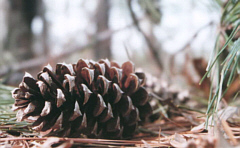 The Mental
Health section was internally divided into slices to provide support for the three brigades that made up the 25th
Infantry Division. I was assigned to 3rd Brigade in the event they were ever sent any where. What this meant
was in addition to going to my own unit's field exercise, I also went to 3rd Brigade's. In February 1995 they went
to the Joint Readiness Training Center (JRTC) in Louisiana. We spent 30 days there freezing our butts off and
getting shot at by Russian helicopters. I think I had the privilege of dying three or four times. If
any one thing stood out to me in Louisiana, it was the size of the pine cones. I think that must be strange, but I
would never seen them so large and perfectly formed before. I was compelled to photograph a few of them as well as
contrive a reason to include them here. The Mental
Health section was internally divided into slices to provide support for the three brigades that made up the 25th
Infantry Division. I was assigned to 3rd Brigade in the event they were ever sent any where. What this meant
was in addition to going to my own unit's field exercise, I also went to 3rd Brigade's. In February 1995 they went
to the Joint Readiness Training Center (JRTC) in Louisiana. We spent 30 days there freezing our butts off and
getting shot at by Russian helicopters. I think I had the privilege of dying three or four times. If
any one thing stood out to me in Louisiana, it was the size of the pine cones. I think that must be strange, but I
would never seen them so large and perfectly formed before. I was compelled to photograph a few of them as well as
contrive a reason to include them here.
We flew from Hawaii to Texas where we stayed for several days in a National Guard
armory because some of the bridges on our route to Louisiana had ice on them. We were all uncomfortable because we
only had what we carried on the plane. We were sleeping on a big slab of cement. The conditions in the field
were ultimately more comfortable.
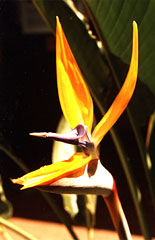 I was
deployed with an NCO who apparently thought work was something to avoid because every time we were asked to do
something, he came up with an excuse not to do it. I did not understand this at all because we were not doing
squat. Eventually I started going around to the different units and talking to soldiers to see how they were
doing. Our unit decided that we were going to pitch in whether we wanted to or not and we ended up carrying
a lot of litters about 150 meters from the landing zone to the treatment tent. This helped my NCO decide that it
would be easier to stay out of harm's way by doing our own mission. I was
deployed with an NCO who apparently thought work was something to avoid because every time we were asked to do
something, he came up with an excuse not to do it. I did not understand this at all because we were not doing
squat. Eventually I started going around to the different units and talking to soldiers to see how they were
doing. Our unit decided that we were going to pitch in whether we wanted to or not and we ended up carrying
a lot of litters about 150 meters from the landing zone to the treatment tent. This helped my NCO decide that it
would be easier to stay out of harm's way by doing our own mission.
I really enjoyed field problems for the most part. I did not enjoy sitting in fox
holes wet and shivering all night, but getting out and training was often as fun at it was essential. The
worst part of a field exercise was when it was over. Everyone was in such a hurry to get out of there that the
equipment always got trashed when it was tossed onto trucks. When we got back we had to sort it all out and clean
it which usually took about a week. Once that was over it was back to business as usual in the clinic.
Eventually SSG Hyler and CPT Wheeler both received orders and left the unit. My
next NCOIC had been doing a different job previously so it took him a while to come up to speed on how we performed our
mission. At one point we had soldiers in Haiti, Egypt and leadership schools all at the same time. This left
a small handful of us to man the shop. During this time the unit kept pulling us to perform other duties and
actually told us to put a closed sign on the door. The Division Surgeon stepped in at that point and said he did
not want to explain to someone's parents that the reason their kid had commit suicide was because the mental health team
was out mowing lawns.
 My
off-duty time was enjoyable with the exception of barracks life as I already described. I did not have a car in
Hawaii but I did have my bike. My friend Jeff and I rode all over the islands. Normally on Saturday mornings
we would ride twenty or thirty miles. Sometimes we just rode and other times we would stop and take pictures or
ride into one of the local towns and look around. Jeff was a much stronger rider than I was so I had to push
myself to keep up with him. He was involved with several other activities as well. My
off-duty time was enjoyable with the exception of barracks life as I already described. I did not have a car in
Hawaii but I did have my bike. My friend Jeff and I rode all over the islands. Normally on Saturday mornings
we would ride twenty or thirty miles. Sometimes we just rode and other times we would stop and take pictures or
ride into one of the local towns and look around. Jeff was a much stronger rider than I was so I had to push
myself to keep up with him. He was involved with several other activities as well.
Jeff participated in a Tai Kwon Do classes as well as volunteering many hours at the
gym. Eventually he went to Officer Candidate School and was commissioned. I lost touch with Jeff while in
Germany, but I am sure he's doing well in the Army somewhere. One thing I can say about Jeff is that he was one of
the most generous people I ever knew. If I ever needed anything and he had it, he would toss it my way. I
took leave during spring break one year to hang out with my sister and as I was leaving the barracks he handed me his
brand new very expensive video camera. I asked him why he handed it to me and he said "Have fun!" So I did.
Many of the soldiers in Hawaii complained of having "Island fever" whatever that is. Most of these guys sat in
their rooms getting drunk during their off-duty time which made it really hard for me to sympathize with them. I
am fairly certain that drinking a case of beer while surrounded by four walls can not be much different in Kansas than
it is in Hawaii.
The two photographs shown above were taken right in front of my unit and I was asked countless times where they were
taken by people living right there.
Something that stood out to me in Hawaii was noted during my bike rides. Going
down the road it occurred to me how the houses in hills look like litter in the gutters. They really mar the
beauty of the islands. But in order to live somewhere housing has to be built. They should make some laws
that only straw huts can be built on a tropical island and if people do not like they live somewhere else.
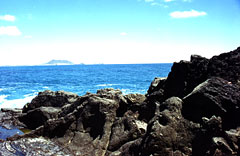 There
were a lot of things to do there besides the standard tourist fare. For those who do not care for beaches, the
inner portions of the island has waterfalls and beautiful hiking trails surrounded by tropical foliage. Things are
more expensive in Hawaii but not unaffordable if the Army is paying your rent. At the time I was there I could get
round-trip airfare to another island, stay for three days and two nights, and get rental car for $125.00. I never
did this, but I wish I had. Instead I bought a computer. Once I learned how to use it, I almost never left
my barracks room again. There
were a lot of things to do there besides the standard tourist fare. For those who do not care for beaches, the
inner portions of the island has waterfalls and beautiful hiking trails surrounded by tropical foliage. Things are
more expensive in Hawaii but not unaffordable if the Army is paying your rent. At the time I was there I could get
round-trip airfare to another island, stay for three days and two nights, and get rental car for $125.00. I never
did this, but I wish I had. Instead I bought a computer. Once I learned how to use it, I almost never left
my barracks room again.
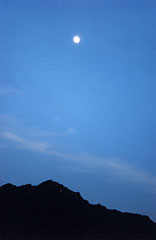 The nice thing about being in the Army is that when you go somewhere, you usually go for a while. Unlike tourists
who have to do as much as they can in a short time, soldiers can spread things out and take their time. I did
pretty much everything I wanted to in Hawaii. I never attended a luau, but I have never been attracted to tourist
entertainment. From what I heard, that is pretty much what it was. I went through a couple hundred rolls of
film while I was there and also I photographed a couple of weddings. The nice thing about being in the Army is that when you go somewhere, you usually go for a while. Unlike tourists
who have to do as much as they can in a short time, soldiers can spread things out and take their time. I did
pretty much everything I wanted to in Hawaii. I never attended a luau, but I have never been attracted to tourist
entertainment. From what I heard, that is pretty much what it was. I went through a couple hundred rolls of
film while I was there and also I photographed a couple of weddings.
Being
stationed in a field unit as a first tour should be the rule in my opinion. I learned so much about our mission
that I felt I could pretty much handle any situation within my scope by the time I left. When I was stationed in
my first hospital it never ceased to amaze me how many people had more years in service than me but had never been in a
field unit or to the field. A lot of these people are scared of it because they equate field with misery.
There is some truth to that, but field time is not nearly as bad as it is made out to be. Even if the experience
is miserable, they still have stories to tell when they get back with as many embellishments as they care to add.
That is the rules.
I was finally put on orders to go to Ft. Campbell, Kentucky in 1996. I left
Hawaii three years to day after I had arrived. As usual I was looking forward to my next assignment as well as
being sad to go. All my close friends had already left Hawaii, so the tearful goodbyes had already taken place.
I hope one day I have the opportunity to visit Hawaii again, but in my heart I know that as a tourist it just will not
be the same. But I never know what the future holds and I could possibly make it my residence one day.
Realistically, however, I think Hawaii will probably just remain a memory.
|
